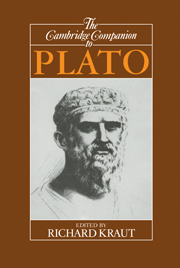Book contents
- Frontmatter
- 1 Introduction to the study of Plato
- 2 Plato
- 3 Stylometry and chronology
- 4 Socrates and the early dialogues
- 5 Mathematical method and philosophical truth
- 6 Inquiry in the Meno
- 7 Plato and Greek religion
- 8 Platonic love
- 9 Plato's metaphysical epistemology
- 10 The defense of justice in Plato's Republic
- 11 Plato on poetic creativity
- 12 Good-bye to the Third Man
- 13 Plato's Sophist on false statements
- 14 Disintegration and restoration
- 15 Plato's later political thought
- Bibliography
- Index
12 - Good-bye to the Third Man
Published online by Cambridge University Press: 28 May 2006
- Frontmatter
- 1 Introduction to the study of Plato
- 2 Plato
- 3 Stylometry and chronology
- 4 Socrates and the early dialogues
- 5 Mathematical method and philosophical truth
- 6 Inquiry in the Meno
- 7 Plato and Greek religion
- 8 Platonic love
- 9 Plato's metaphysical epistemology
- 10 The defense of justice in Plato's Republic
- 11 Plato on poetic creativity
- 12 Good-bye to the Third Man
- 13 Plato's Sophist on false statements
- 14 Disintegration and restoration
- 15 Plato's later political thought
- Bibliography
- Index
Summary
Plato's commitment to what has been called “self-predication” that is, to sentences of the form
Bravery is brave
The Large is large
is one of the most evident and characteristic features of his work. This commitment figures in dialogues of all three periods, and is so far from optional as to be at the foundation of Platonism. Yet these sentences immediately produce negative reactions in us. The first one displayed above, for example, seems clearly false. It seems to be attributing a feature to Bravery that it could not have - we can hardly imagine it performing deeds of valor or bearing up under adversity. The characteristic claim that the Large is large without qualification seems ludicrously to take its subject as another thing like an elephant, only bigger. The presence of claims of this type in Plato's text can make us feel that his way of thinking is not merely foreign to us, but seriously confused as well. Aristotle's rude and dismissive outburst “So good-bye to the Forms. For they are nonsense” seems about right.
Our background suspicion that the Platonic Forms may not really be respectable makes the Parmenides especially intriguing to us. For that dialogue owes its fame to the presence, in its first part, of an exchange between a young Socrates and a venerable Parmenides. The utterances of Socrates are reminiscent of statements that are widely regarded as constituting Plato's theory of Forms, as presented in the Republic and the Phaedo. Yet here, when questioned by Parmenides, Socrates fails repeatedly to uphold his views, and falls into perplexity. This passage has seemed to generations of readers to show a sensitivity to the kinds of problems they themselves associated with Platonism (including but not confined to confusion over self-predication).
- Type
- Chapter
- Information
- The Cambridge Companion to Plato , pp. 365 - 396Publisher: Cambridge University PressPrint publication year: 1992
- 26
- Cited by



